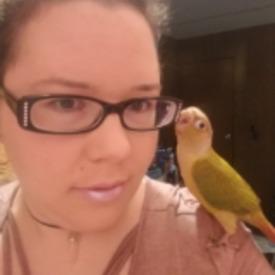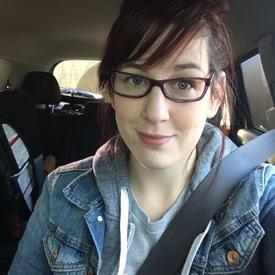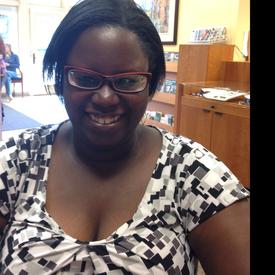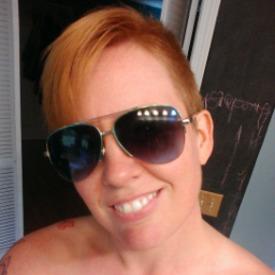why do you use a scale to weigh food?
Replies
-
I like being accurate on my portions. My family can tell you that I'm REALLY good at eyeballing portion sizes but _I_ like knowing they are correct. Also if a portion size is X grams and you can put the portion in X grams if you weigh a fruit it gives you a much more accurate calorie count. I've had Japanese persimmons that were 144 grams and persimmons that were twice that size but I would have had NO clue how many grams they were if I hadn't weighed them.0
-
Scales are pretty grand for anything that signigicantly changes volume when cooking, or after cooling. And trying to standardize a volumetric cup of, say, sliced mushrooms? Sort of a trial. I don't always have one to use, but I like to pop things on the salad scale at my cafeteria to double-check portion sizes against the nutritional info I'm using. Especially helpful with baked goods... be honest, you're not going to be able to eyeball 2.5oz of a big Sbux-sized brownie.0
-
I weight everything! And it doesn't matter to me if I count for the rest of my life if it allows me to stay in shape.0
-
I love my food scales …. I need it for accuracy …. it is all about portion size if you want to loose weight. I weigh things such as potatoes, meats, nuts. (anything that is in grams or ounces) it is easy when you get used to doing it….it becomes second nature eventually.
I go by the product it self..if it says 1 Tablespoon/teaspoon... I use my measuring spoons…. if it says 50 grams or 2 ounces I use the scales. If it says 1/4 cup then I use my measuring cups!!
Not hard to do….0 -
Pretty much what others have said. It's a matter of being able to accurately measure how much food you're eating. And hey, isn't that the goal for most of us here?
Besides that, as Alton Brown would say, it's not a "uni-task-er". If you're into baking at all, it's definitely best to measure by weight and not volume. You need a scale for that 0
0 -
I used to eat a bowl full of cereal believing that was a "serving" then I got some scales and weighed the proper 30g serving and found it was 1/3 of what I was eating, I was shocked.
This made take a very close look at what I considered a "portion" and I was wildly innacurate in estimating how much I was eating and that is how I got fat.0 -
this is why i asked the question. to educate myself. im not trying to put anyone down for doing it. just curious. some people did bring up good points. some of the foods you are using it for make total sense. i guess ive been scared of peanut butter due to the high calories. and things like pasta and rices make sense. i usually prepare half the box and add the ingredients into the recipes and just divide it based on the servings. i have found little ways to cheat. i guess i dont pay much attention to how accurate meat is and veggies. i dont want to get totally calorie obsessed over raw veggies and such. i see it as a victory me even eating those. i may listen to most of you and get one to experiment. does not hurt.0
-
Because I love accuracy. And because it keeps me honest. I've been at this for a long time and generally know about what an once of shredded cheese looks like (for example), but the extra 3 seconds it takes for me to measure it on my scale makes me feel confident that I'm accurately tracking my intake. I don't eat at a huge deficit, so little inaccuracies can make a significant difference for me.
Also, I'm currently deeply addicted to almond butter. That stuff is waaaay too calorie dense to be overestimating what a tablespoon looks like on a regular basis so I'd rather just measure it out in grams to be safe.0 -
The food scale seems very important for me when it comes to high calorie foods. Meats, nuts, cheese are a few of the things that accuracy seems important. I imagine that after weighing things for years then you would probably be able to eyeball things with much better accuracy. It has been said that many people underestimate their calorie intake by 20% and I don't want to be one of those people.0
-
this is why i asked the question. to educate myself. im not trying to put anyone down for doing it. just curious. some people did bring up good points. some of the foods you are using it for make total sense. i guess ive been scared of peanut butter due to the high calories. and things like pasta and rices make sense. i usually prepare half the box and add the ingredients into the recipes and just divide it based on the servings. i have found little ways to cheat. i guess i dont pay much attention to how accurate meat is and veggies. i dont want to get totally calorie obsessed over raw veggies and such. i see it as a victory me even eating those. i may listen to most of you and get one to experiment. does not hurt.
I don't generally weigh veggies. I just eyeball those because I figure they aren't calorie dense enough to worry about. I agree with you- better to be eating too many veggies than too few!0 -
I use a scale, measuring cups and spoons depending on the food.
Yes, I agree.
Weighing food by scales doesnt seem at all difficult to me. I serve up my dinner with plate on the scales and then put meat on, reset scales, put potato on, reset, put carrot on, reset etc - very easy to get weight of everything that way.
But I also use cups for liquids and spoons for things like sauces or gravy.
and I dont weigh everything - if I eat a piece of toast I just log it in as one slice or a banana I just log it in as small banana 58 cal's - all my bananas obviously arent exactly same size but I think it evens out.
If Im out somewhere I find it difficult to estimate sizes - cant take my scales to a restaruant LOL - but accuracy would suffer.0 -
Do an experiment for me. Tare a spoon, then measure what you think to be an accurate portion of peanut butter, then weigh it and report back. You will understand after this experiment.
THIS!!!!!!!!!!!!!!!!0 -
Cereal is the worst for this! A single serving of cereal is such a tiny amount!I used to eat a bowl full of cereal believing that was a "serving" then I got some scales and weighed the proper 30g serving and found it was 1/3 of what I was eating, I was shocked.
This made take a very close look at what I considered a "portion" and I was wildly innacurate in estimating how much I was eating and that is how I got fat.0 -
I get why people use one - I use estimates and occasionally a measuring cup - I know that the estimates can be off but use this whole process for general health -- that has gone pretty well for me, but more power to anyone who does it.0
-
I use mine because it's more accurate, and it's easier than dirting a million measuring cups to figure out my portion sizes. I got a digital one that I can tare out after each item is added. It saves me a ton of time!0
-
Do an experiment for me. Tare a spoon, then measure what you think to be an accurate portion of peanut butter, then weigh it and report back. You will understand after this experiment.
She's right. I was the worst at peanut butter (before). In my opinion, if it fit on the spoon, it was a tablespoon. In reality, i was probably eating 4 tablespoons, twice the serving size...the difference of eating 190 calories or 380 calories is a lot when you're restricting. I use my scale for everything now, but I'm getting better and better at understanding portions and one day I'll be able to do it on my own. For now, I have to re-learn what a portion is. 0
0 -
so it's correct0
-
Because our minds are tricky.
And knowing the weight of even healthy things can be a big difference.
The Peanut butter is a PRIME example0 -
because I don't "see" a normal portion size. I need something to help me know what's really a portion.
^^ This. I was shocked when I first began logging and using my scale how much difference there was in what I thought the portion size was and how much it really was. I'm much better now that I've spent a lot of time using my scale. I am in "maintenance" mode and I no longer log/weigh food on weekends, but I still do every weekday. Maybe some day I'll reduce to maybe 3 days a week, or eventually not at all if I don't gain weight after stopping. However, I can't imagine that I won't need some constant reminder, though.0 -
How else will you measure how much you're eating? Especially when you eat fresh, wholesome things that don't come out of packages with serving sizes conveniently marked on them?0
-
I use a scale. When i began i weighed everything.
Now i've learned to predict most things as i know the portion sizes (roughly) but try to over estimate a little just to make sure.
Its the one tool thats truly helped me fight this battle, and i can see myself using it in the long term as whats a few seconds to weigh something.
Id rather use my scale than jump on some 'Shake' thats not really going to help me deal with real foods in the long run.0 -
The scale is one of the best items in my tool kit. I measure most things. For example, a serving of an orange is aroug 180g. Most of the oranges I get weigh in at 200-300g. If I called it a small orange, I'd be severely underestimating it.
I am also terrible about portioning our meat. What I think is 3 ounces is ways 4.x.
As for a longer term plan, I tend to like the plate method: 50% of your plate with veggies, 25% with protein and 25% with grains..... this seems to be a good way to stay balanced.0 -
To keep calories accurate. It isn't that tough once you get used to it.0
-
because I don't "see" a normal portion size. I need something to help me know what's really a portion.
this.
And the loss of 52 pounds later, it's been working.0 -
Do an experiment for me. Tare a spoon, then measure what you think to be an accurate portion of peanut butter, then weigh it and report back. You will understand after this experiment.
+1
Insightful0 -
I generally only use a scale when I am cutting weight, usually for summer. I, like many others can eyeball things rather well but to know that I am right on with my macros I always use a scale. When I first started getting into fitness and started my weight loss journey I used the scale to be accurate so I would not over eat. Food scales are a must and they are a great and inexpensive tool for your kitchen and overall health.0
-
Example, today I made a chicken salad. I buy the Tyson chicken in the frozen section, In the past I guessed the 3oz, today I weighed it (just bought my scale a couple days ago) I was putting 9oz on my plate. Two pieces is 3oz. Difference of two hundred calories. That's big. So for me, I weigh everything now. I know exactly what I have consumed and what I have burned through my hrm. This is just me.0
-
Doing so initially helps you learn what constitutes a serving size. Eventually you become able to eyeball it within grams. For example, you may think it's a half cup of Ben & Jerry's (which is one serving, about 230 calories): turns out it's almost double (meaning 345 or more). Makes a HUGE difference when logging calories, especially if you stop to do the actual math.0
-
Example, today I made a chicken salad. I buy the Tyson chicken in the frozen section, In the past I guessed the 3oz, today I weighed it (just bought my scale a couple days ago) I was putting 9oz on my plate. Two pieces is 3oz. Difference of two hundred calories. That's big. So for me, I weigh everything now. I know exactly what I have consumed and what I have burned through my hrm. This is just me.
And look at that ticker! You go girl!0 -
because I don't "see" a normal portion size. I need something to help me know what's really a portion.
^^^^^^ This.
My measured portion is always so different than the food labels is. Guess who's is bigger?!0
This discussion has been closed.
Categories
- All Categories
- 1.4M Health, Wellness and Goals
- 398.1K Introduce Yourself
- 44.7K Getting Started
- 261K Health and Weight Loss
- 176.4K Food and Nutrition
- 47.7K Recipes
- 233K Fitness and Exercise
- 462 Sleep, Mindfulness and Overall Wellness
- 6.5K Goal: Maintaining Weight
- 8.7K Goal: Gaining Weight and Body Building
- 153.5K Motivation and Support
- 8.4K Challenges
- 1.4K Debate Club
- 96.5K Chit-Chat
- 2.6K Fun and Games
- 4.8K MyFitnessPal Information
- 12 News and Announcements
- 21 MyFitnessPal Academy
- 1.5K Feature Suggestions and Ideas
- 3.2K MyFitnessPal Tech Support Questions























